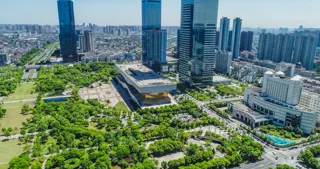Sustainable Building Practices in New Chandigarh: Impact on Property Values
 New Chandigarh, a planned city known for its innovation and ecological awareness, is transforming real estate through sustainable building practices. As green credentials grow in global markets, Chandigarh’s approach rooted in strict policies and smart design positions it as a model, driving both consumer demand and property value appreciation.
New Chandigarh, a planned city known for its innovation and ecological awareness, is transforming real estate through sustainable building practices. As green credentials grow in global markets, Chandigarh’s approach rooted in strict policies and smart design positions it as a model, driving both consumer demand and property value appreciation.
Green Certifications Driving Premium Pricing
LEED and GRIHA Compliance Following international standards like LEED and GRIHA has become essential for buyers who value prestige. These certifications ensure:
- Reduced Energy Costs: Through optimized HVAC systems and natural lighting
- Higher Resale Value: Certified properties often command 5-10% price premiums, according to market reports
- Compliance Assurance: Mandatory for new public-sector projects like HPHC’s police buildings
Net Zero Energy Leadership The Haryana Police Housing Corp (HPHC) leads in net zero energy buildings, incorporating:
- Solar Dominance: Rooftop solar panels and smart home integration are now standard for new constructions
- Hybrid Energy Systems: Wind turbines and biogas feasibility explored for diversified energy portfolios
- Smart Building Management: Real-time energy monitoring via advanced BMS (Building Management Systems)
Policy Backed Sustainable Designs
Chandigarh enforces strict green building codes, including:
- Source Segregation: Mandatory waste separation in residential complexes
- Energy Efficiency: Orientation-optimized designs maximizing natural light/ventilation
- Water Conservation: Rainwater harvesting systems and greywater recycling gaining traction across developments
Cities Waste Management Model Chandigarh’s eco-friendly urban planning sets benchmarks:
- Circular Economy: Composting organic waste; recycling non-organic waste
- Landfill Reduction: Segregation at source decreases landfill dependency
Buyer Demand Shifts: Eco-Conscious Purchasing
Premium Pricing for Green Homes
- Luxury Developments: High-end projects now featuring solar panels, harvesting systems, and smart water management
- Suburban Trends: Rapid adoption of energy-efficient HVAC in mid-range properties
- Urban Preferences: Young buyers prioritizing certifications over traditional status symbols
Developer Responses
Real estate firms are strategically:
- Green Tech Integration: Installing rooftop solar and insulation in new projects
- Certification Pursuit: Seeking LEED/GRIHA ratings to justify price increases
- Policy Compliance: Adapting designs to meet strict building codes
Future Trends: Expanding Green Footprints
Net Zero Expansion
- Public Sector Leadership: HPHC’s police infrastructure serving as templates for sustainable design
- Private Adoption: Luxury homes adopting permaculture techniques and alternative materials
- Policy Evolution: Strengthened building codes as green technology advances
Potential Challenges
- Initial Costs: Higher upfront expenses for green features
- Consumer Education: Need to highlight long-term savings and value benefits
- Infrastructure Gaps: Limited availability of renewable energy tech suppliers
Conclusion
New Chandigarh’s sustainable building practices are driving property value growth, blending policy-driven standards with market-driven innovation. As green technology matures and buyer priorities shift, the city’s real estate sector may emerge as India’s benchmark for eco-conscious urban development.